- Oct 20
- Drug Addiction Treatment
When you picture someone who has a substance use disorder, what comes to mind? The media influence on drugs and alcohol might cause you to imagine a person who’s down on their luck, living on the streets or who has mental health issues.
Depending on the drug in question, you might imagine different types of people. For example, marijuana stereotypes differ from alcohol stereotypes, and heroin stereotypes differ from cocaine stereotypes. Movies like “The Wolf of Wall Street” might give you a certain impression of Wall Street drug use, while films like “Trainspotting” create an image of heroin addiction.
Stereotypes of those who misuse substances paint everyone with broad strokes using the same brush. But the reality is that there’s no one “type” of person who is more likely to experience substance use disorder than another. Understanding that anyone can use substances and struggle with addiction is key to moving beyond the stereotypes and stigma of drug addiction.
Take a look at some commonly held assumptions about drugs and the people who use them.
- Some Substances Are “Safer” Than Others
- All Substance Users Are…
- Only Rich People Use…
- Women Who Use Drugs Are…
- Get Help for Substance Use Today
Some Substances Are “Safer” Than Others
Whether they are legal or not, all substances, from marijuana and alcohol to heroin and prescription pain relievers, have risks.
In recent years, marijuana has been given a health halo, with many people pointing out the potential benefits of the drug while overlooking the risk of using it for some people. For example, while marijuana is used for addressing certain medical conditions’ symptoms, it can also have adverse effects. According to the Centers for Disease Control and Prevention (CDC), heavy marijuana use can affect a person’s memory, attention span and learning abilities. Marijuana smoke is also harmful to the lungs.
Alcohol is another substance that gets a health halo. There are countless articles out there describing the potential health benefits of drinking alcohol. These articles usually include a disclaimer that notes that if you don’t currently drink alcohol, there’s no reason to start for your health and that too much alcohol can be harmful.
What stories about the supposed health benefits of alcohol miss are that other studies, such as an examination of alcohol use in 195 countries, found the potential harm of alcohol outweighs its benefits. But because alcohol is legal and often consumed at social gatherings and special events, it’s developed a stereotype of being “safe.”
When thinking about substance use and the risk of harm, it’s important not to put certain substances up on a pedestal or assume that the use of some substances is inherently worse or riskier than others. Having the use of some substance be more socially accepted often means the consequences for people who use less-socially accepted substances are more severe. It also means individuals may dismiss the negative impacts and addiction risk using those accepted substances poses.
All Substance Users Are…
The idea that some substances are “OK” or safer to use than others feeds into the stereotypes and images many people have of those who use drugs. These stereotypes can prevent people from accepting they have a problem with alcohol or drug use and can keep them from getting the professional treatment they need to move beyond the substance use disorder.
For instance, there are pervasive and harmful stereotypes that all people who use drugs are:
- Criminals: While it is illegal to possess or sell certain substances, not everyone who uses drugs is a criminal or engages in criminal activity. If a person is over 21 years old, it’s legal for them to buy and consume alcohol. Marijuana, whether for medical or recreational use, is legal in many states now. People who misuse prescription medications often start using them under the advice of their doctor to treat medical issues. Even if a person purchases or possesses illicit substances, they aren’t necessarily “evil” or “bad.”
- Poor: Another common assumption is that all people who struggle with substance use or misuse are financially struggling. While drug and alcohol use can get expensive and might contribute to a person’s financial difficulties, there are plenty of wealthy people who misuse medications or who develop substance use disorders. A person doesn’t have to be “down on their luck” or experiencing homelessness to begin to use substances. Substance use doesn’t always lead to financial problems.
- Broken: It is possible for a person to have a substance use disorder and a co-occurring disorder, such as PTSD, depression or anxiety. But not all substance users have additional mental health issues, and not everyone who develops a problem has some sort of skeleton in their closet. You don’t need to have undergone a traumatic experience to develop a dependency on a substance. People with relatively peaceful lives, from intact families and without any other signs of mental illness can also develop a substance use disorder.
Along with the stereotypes about who drug users are, there are also many stereotypes about the type of drugs certain groups of people use. In some cases, these stereotypes are fed by the media and the news cycle.
Only Rich People Use…
Some types of drugs, such as cocaine, are often depicted as the drugs of the rich and famous. There are many tales of corrupt Wall Street brokers, rich actors and socialites using cocaine and other party drugs. The stereotype lends a certain glamor to some drugs, potentially making them look more appealing to others and feeding into the idea that some drugs are safer than or preferable to others.
Women Who Use Drugs Are…
According to the National Institute on Drug Abuse, men are more likely than women to use drugs. That fact might feed into gender-related stereotypes about drug and alcohol use and can affect the perceptions of people who use drugs based on their gender.
For example, a paper on managing stigma among women who use drugs noted that women who smoke or use cocaine or methamphetamine are often regarded as “trash.” Meanwhile, the perceptions of men who use the same substances tend to be more positive, such as being “more masculine.” The stigmatization of women who use drugs can prevent them from getting the treatment they need.
Get Help for Substance Use Today
Using drugs or alcohol doesn’t reflect on your character or mean that you are a bad person. If you want to address your addiction, Gateway Foundation offers professional medical treatment programs to help you do so. Our services include medically supervised withdrawal management, group and individual therapy and relapse prevention. If you’re ready to enroll or to learn more about a treatment program, contact us today.




